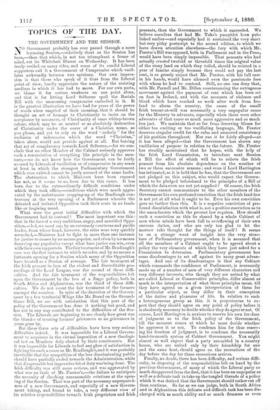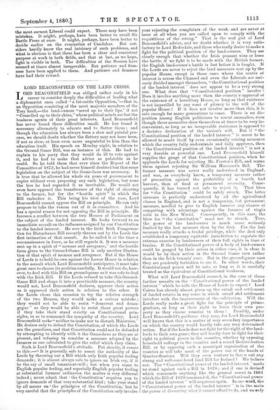TOPICS OF THE DAY.
THE GOVERNMENT AND THE SESSION.
NTO Government probably has ever passed through a more III harassing Session,—relatively short as the Session has been,—than that which, in not too triumphant a frame of mind, eat its Whitebait Dinner on Wednesday. It has been freely reviled on many sides, and some of its candid Liberal supporters call it a Government of Compromise which vacil- lates awkwardly between two opinions. Our own impres- sion is that those who speak of it thus from the Liberal point of view, hardly appreciate the nature of the resisting medium in which it has had to move. For our own parts, we blame it for serious weakness on one point alone, and that is for letting Lord Selborne spoil the Burials Bill with the unmeaning compromise embodied in it. It is the greatest illustration we have had for years of the power of words when emptied of their meaning, that it should be thought an act of homage to Christianity to insist on the acceptance by mourners, of Christianity of some whitey-brown colour, which may be as neutral or as absolutely destructive of Christianity under the cover of a Christian name, as you please, and yet to rely on the word "orderly " for the exclusion of indecencies which the word " Christian," taken alone, would not provide against at all. But barring that act of complacency towards Lord Selborne,—for we con- clude that no other Member of the Cabinet seriously approves such a renunciation of everything like principle in the mea- sure,—we do not know how the Government can be fairly accused by Liberals of vacillation or of compromise in any sense at least in which the strongest Parliamentary Government which ever existed cannot be justly accused of the same faults. The obstruction to which Ministers have been exposed has not, as it seems to us, been due to this cause. It has been due to the extraordinarily difficult conditions under which they took office,—conditions which were much aggra- vated by the unfortunate cropping-up of the Bradlaugh con- troversy at the very opening of a Parliament wherein the defeated and irritated Opposition took their seats in no lamb- like or forgiving mood. What were the great initial difficulties with which the Government had to contend ? The most important was this : that in the face of a very ambitious, angry, and mortified Oppo- sition,—led, we must say, by an extremely courteous and pacific leader, from whose hand, however, the reins were very quickly wrenched,—Ministers had to fight in more than one instance for justice to causes by no means popular, and often by no means deserving any popularity except what bare justice can win, even with their own supporters. The fair treatment of Mr. Bradlaugh's case was the first instance to which we refer, and by no means a fortunate opening for a Session which many of the Opposition have treated as a Session of revenge. The fair treatment of the Irish peasant in face of the violent and discreditable pro- ceedings of the Land League, was the second of these diffi- culties. And the fair treatment of the responsibilities left upon the Government by the lees of a Jingo policy, both in South Africa and Afghanistan, was the third of these diffi- culties. We do not count the fair treatment of the farmers amongst the number. In spite of the desertion of the Govern- ment by a few territorial Whigs like Mr. Brand on the Ground- Game Bill, we see with satisfaction that this part of the policy of the Government has done it nothing but good, and has not in any way contributed to the difficulties of the Ses- sion. The Liberals are beginning to see clearly how great was the blunder of treating farmers' grievances as no grievances in years gone by. But these three sets of difficulties have been very serious
difficulties indeed. It was impossible for a Liberal Govern- ment to acquiesce in the virtual imposition of a new theologi- cal test on Members duly elected by their constituents. But it was impossible for Liberals to feel any glow of satisfaction in fighting for such a cause as Mr. Bradlaugh's,and it was probably inevitable that the sympathies of the less discriminating public should have partially cooled towards the Administration, while that disagreeable but imperative bit of duty was being done. The Irish difficulty was still more serious, and was aggravated by what was no fault of Mr. Forster's,—the failure to anticipate the necessity of checking unreasonable evictions at the open- ing of the Session. That was part of the necessary unprepared- ness of a new Government, and especially of a new Govern- ment taking, and bound to take, a very different view of its relative responsibilities towards Irish proprietors and Irish
peasants, than the Government to which it succeeded. We believe ourselves that had Mr. Tuke's pamphlet been pub- lished earlier—and especially had it contained the very short but very pithy postscript to the second edition, to which we have drawn attention elsewhere—the fury with which Mr.- Forster's Bill was opposed, both in Parliament and in the Press, would have been simply impossible. That peasants who had actually created twofold or threefold times the original value of the stony land on which they toiled, should be evicted in a year of famine simply because they could not pay the last- rent, is so grossly unjust that Mr. Forster, with his full case in his hands, would have silenced even the passionate foes. with whom he had to contend. Still, no one can deny that, with Mr. Parnell and Mr. Dillon countenancing the outrageous movement against the payment of rent which has been set on foot in Ireland, and with the accounts of violence and blood which have reached us week after week from Ire- land to alarm the country, the cause of the small Irish tenant-at-will was necessarily a very unpopular cause for the Ministry to advocate, especially when there were other advocates of that cause so much more aggressive and so much less just. We maintain that so far from deserving blame for either too exciting or too vacillating language, Mr. Forster deserves singular credit for the calm and unmoved consistency of his position throughout. Nor can it be fairly alleged—as. it has been alleged—that the Government has shown any vacillation of purpose in relation to the future. Mr. Forster has steadily maintained that he hopes, with the help of the Irish Land Commission, to introduce next Session a Bill the effect of which will be to relieve the Irish peasant from his absolute dependence on the weather of two or three successive seasons ; and even if Lord Hartington has intimated, as it is held that he has, that the Government are not pledged on this subject, who would expect the Govern- ment to be pledged beforehand to the principles of a Bill of which the data even are not yet supplied ? Of course, the Irish Secretary cannot communicate to the other members of the Government his own profound conviction that the Irish land-law is not yet at all what it ought to be. Even his own conviction. goes no farther than this. It is a negative conviction of pro- found dissatisfaction with what is, not a positive conviction as to. the amendments which the present law requires. How should such a conviction as this be shared by a whole Cabinet of men whose minds have been full to overflowing of their own onerous duties, and who are only too glad to let the morrow take thought for the things of itself ? It seems to us a strange want of insight into the very struc- ture of Parliamentary government, when it is assumed that all the members of a Cabinet ought to be agreed about a policy the very elements of which they have just asked for a Commission to determine. Parliamentary government has some disadvantages to set off against its many great advan- tages. And one of its disadvantages is that any Cabinet which commands the confidence of Parliament, is necessarily made up of a number of men of very different characters and very different interests, who though they are united by what are called Liberal or Conservative principles, differ almost as much in the interpretation of what these principles mean, till they have agreed on a given interpretation of them for a particular object, as they differ in their conception of the duties and pleasures of life. In relation to such a heterogeneous group as this, it is preposterous to ex- pect that they should agree on any point of policy before it is absolutely necessary to decide whether they do agree ornot. Of course, Lord Hartington is anxious to reserve his own freedom of judgment as to the Irish policy of the Government, till the moment comes at which he must decide whether he approves it or not. To condemn him for thus reserv- ing his freedom of judgment, is to condemn the necessarily hand-to-mouth system of Cabinet Government. You might almost as well expect that a party assembled in a country house, who are united only by their friendship for one and the same host, should agree on the recreations of the day before the day for those recreations arrives.
Finally, no doubt, there has been difficulty, and serious diffi- culty, in disposing of the responsibilities left on hand by the previous Government, of many of which the Liberal party se much disapproved from'the first, that it has been an unpopular as well as a delicate task to take up the tangled threads of a policy which it was desired that the Government should rather cut off than continue. So far as we can judge, both in South Africa and in Afghanistan this delicate and difficult, task has been dis- charged with as mach ability and as much firmness as even
the most earnest Liberal could expect. There may have been mistakes. It might, perhaps, have been better to recall Sir Bartle Frere at once. It might, perhaps, have been better to decide earlier on the evacuation of Candahar. But out- siders hardly know the real intricacy of such problems, and what is obvious is that there has been a clear and consistent purpose at work in both fields, and that at last, as we hope, light is visible in both. The difficulties of the Session have seemed at times almost insuperable. But patience and firm- ness have been applied to them. And patience and firmness have had their reward.



































 Previous page
Previous page